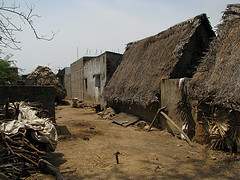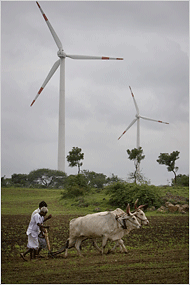
When we start talking about fossil fuels, most of us immediately think of coal, oil, and natural gas. But in the developing world where many people have little to no access to electricity — or even in places that do but have regular issues with outages — these are all secondary to kerosene.
In India, despite major advances in technological sectors in recent decades, 70% of rural areas still have no electricity, and 60% of these households rely on kerosene as their primary source of energy. Even more use their kerosene lamps as standard backups during outages. This presents several major problems.
First, kerosene is as expensive as it is inefficient. (For the same level and quality of light, kerosene is 325 times more expensive than a standard incandescent bulb and 1,625 times more expensive than a CFL.) And given the expense, the Indian government budgets a 340 billion rupee kerosene subsidy annually to provide their poorest citizens with energy. Second, burning kerosene releases chemicals harmful to both the environment and people. Coupled with the danger of an open flame and flammable fuel inside residences, which often results in accidental structural fires, burning kerosene consistently causes respiratory problems, burns, ocular issues, and accidental poisonings as well as releases greenhouse gases into the atmosphere.
However, there is an alternative. Kerosene lamps, which have been around at least since the Victorian era, are slowly being replaced with solar lanterns, fluorescent lamps powered by rechargeable batteries that are in turn supplied with energy by solar photovoltaics. Like most battery-powered lanterns, these lamps give off a better quality of light than their kerosene counterparts while emitting none of the harmful gases.
Earlier this week, two researchers at the University of Taiwan published the results of a study that began in 2004 in India that delineates the benefits of replacing kerosene lamps with solar lanterns. They found that households both above and below the poverty line saved significantly on energy expenditures. Women and school-aged children benefited in particular, gaining more hours in which to accomplish housework and study, respectively. The children’s performance at school markedly increased with more hours in which to study. They concluded that “the use of solar energy will contribute to India’s future energy security, particularly in rural areas where the technology that converts sunlight directly into electricity offers a decentralized alternative to uncertain electricity supplies. If implemented efficiently, renewable energy projects could not only improve the quality of life for India’s rural poor but also enhance sustainable use of the environment.”
The biggest problem with solar lanterns, of course, is that they are almost prohibitively expensive for those that they are most likely to benefit. Various companies, academic groups, and even a few private individuals have provided small scale solutions, subsidizing the cost of this technology for small groups and specific regions and occasionally even making outright donations to rural schools and the like. However, with India’s vast and growing population, it may yet be some time before everyone who could benefit from such a simple, useful device will be able to set aside the kerosene lamp in favor of their own solar lantern.
Photo Credit: mckaysavage at flickr




we a youth led NGO in tamilnadu working with youth and women of tribal and rural commun ities is interested in knowing more about your solar lanterns, cooker, street lights and etc , if interested, pls send us a clear pamphlet to the following address
jeevakarunya trust
Do.No:241/ 231 old
chennimalai andaver road, s
asthri nagar ,
erode, tamilnadu ,india
we a youth led NGO in tamilnadu working with youth and women of tribal and rural commun ities is interested in knowing more about your solar lanterns, cooker, street lights and etc , if interested, pls send us a clear pamphlet to the following address
jeevakarunya trust
Do.No:241/ 231 old
chennimalai andaver road, s
asthri nagar ,
erode, tamilnadu ,india